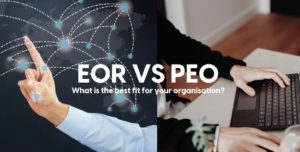Business owners and HR managers frequently struggle to consider using a PEO because they are unsure if their organisation is big enough or too small to qualify for PEO services. A company’s business nature matters once the company’s size reaches a certain scale. In that case, the choice to outsource mostly boils down to your decision whether you would rather hire a PEO for services or handle your HR procedures internally. Still, PEOs offer a host of benefits that go beyond basic operations. If you are hesitant about employing PEO, don’t worry! In this blog, we have explored whether and how a business’s size matters for PEO; namely, if you should opt for PEO if you are a large company.
Has My Business Outgrown a PEO?
The decision of whether or not hiring a PEO is a wise move for your business relies on a variety of criteria. This blog explores some factors that can assist you in deciding if your organization should consider hiring a PEO as well as how PEO works for different scales of businesses.
PEO
A PEO, also termed professional employer organization, is a firm to which companies generally contract out part or all of their administrative and payroll duties. PEOs serve as a neutral intermediary, managing all payroll-related duties, employment assistance, and regulatory compliance related to recruiting employees. A business is able to grow and function without needing to establish a local business in the nation by serving as the employer of record for our client’s employees.
It also guarantees that every worker is treated legally following employment regulations, their rights under their work and visa permits are considered, and their payroll is completed on time and precisely. The client company will handle all other administrative tasks, including employee management, progress tracking, and employee compensation.
Factors that Determine Whether You Should Employ PEO
Growth Plans
Businesses face new challenges when they expand because they have to hire more staff and adhere to more regulations. Among the challenges faced by expanding businesses are employee policies, procedure manuals, and new hire documentation. Business owners may have to put in a lot of extra work behind the scenes as a result of growth but it also has a lot of prospects.
Growing firms struggle with transactional HR tasks; a PEO can assist with any or all of these. A PEO will take care of all the paperwork and stress associated with hiring employees, freeing up businesses to expand.
Cash Flow
Depending on the number of employees in a firm, workers’ compensation insurance may be necessary but it can also be costly and confusing. Certain PEOs offer master workers’ compensation plans. Buying worker’s compensation insurance from the PEO may help you improve your cash flow. With no upfront costs or audits to complete, a PEO will charge your workers’ compensation premiums per your payroll cycle, ensuring that your cash flow remains uninterrupted all year long.
Payroll Management
Handling your payroll involves fiduciary responsibilities and can take a significant amount of time and effort each pay month. In-house payroll processing can be a time-consuming job if you have additional payroll problems like commissions, wage garnishments, pre-tax benefit deductions, or tax filings. A PEO will manage every facet of payroll while relieving clients of the time, effort, and liability associated with employing a third-party payroll processor. An HRIS (Human Resource Information System) and time and attendance software are also usually available for use by PEO clients.
Employee Benefit Program
For any organization, finding, selecting, and keeping top talents is a challenge. An employee benefits package is one of the main factors that attracts and retains employees. Putting together a benefits package that is both cost-effective for the firm and appealing to employees while also being hassle-free and feasible, is one of the hardest issues faced by managers and business owners.
Partnering with a PEO might potentially resolve that problem by offering all or some of those services at a lower cost than the market cost. Furthermore, if a business purchases employee benefits through a PEO, the PEO will manage benefit management, relieving its clients of the burden and responsibility associated with it.
Risk of Injury
The workers’ compensation premium increases with risks associated with the job. By creating safety programs, employing a safety manager, providing managers and staff with training, and maintaining a safety handbook, you can contribute to a reduction in those premiums. To keep your workers and workplace safe, you might need to hire a third-party safety consultant if your insurance company does not assist in those areas.
Several PEOs employ certified risk managers to assist clients in maintaining worker safety and gaining greater control over their workers’ compensation premiums. When you are faced with claims, those risk managers can assist with safety protocols and manuals.
PEO and The Size of a Business
Most businesses hesitate to employ PEO due to the size of their businesses. So, to determine whether your business is too large for PEO, let’s see how PEO is used in different sizes of businesses (small, medium, and large).
For Small Businesses
Hiring a PEO is always beneficial for small businesses. This is due to the enormous administrative load that managing a small business with just a few HR staff. Small businesses can obtain master plans that have been developed by a large number of employees by collaborating with a trustworthy Professional Employer Organization (PEO) like Meteors.
Cost savings on workers’ compensation, retirement pensions, and healthcare benefits are some of the advantages of outsourcing to a PEO. A business that does not have a PEO may find it difficult to depend on and interact with brokers and providers on its own. Due to their special relationship with brokers, PEOs are able to access the finest offers.
Some businesses may think that you may not have control over your daily operations if you outsource to a PEO. But actually, you will have full control over your company and staff even after outsourcing specific functions to a PEO. You don’t lose the right over day-to-day management, including the ability to hire and fire your employees.
In addition, PEOs support your current HR staff by taking on routine administrative duties like Payroll, Regulation and conformity, Handbook Development, Policy Creation, Tax Remittance, Benefits Administration, Training Programs, and so on. The HR staff you currently have can then concentrate on expanding your company. Ultimately, a PEO can be a very helpful tool if your small business needs help managing benefits and HR.
For Medium-sized Businesses
Compared to small businesses, medium-sized firms- those with more than 50 employees- have distinct demands. Things only get harder as smaller organizations expand into medium-sized businesses because there is a greater demand for regulatory and legislation expertise as well as a greater compliance burden. To avoid hiring additional HR staff, PEOs offer continuous access to HR specialists. By assessing and putting in place top-notch safety, a PEO can also assist in lowering your workers’ compensation expenses.
Even one compliance error can result in significant fines, inquiries, and even legal action. The compensation and perks associated with hiring in-house HR staff can be more expensive than outsourcing to PEO experts even though you can prevent these problems by hiring HR representatives with compliance experience. By partnering with a PEO, your medium-sized company can gain access to compliance specialists who can offer guidance and guarantee compliance. This is why relying on a reputable PEO for HR and benefits management is highly advantageous for medium-sized firms.
For Large Businesses
If you are a large company, you can do the majority of your internal HR work. You will have a developed internal HR staff over the years and it now meets the majority of your HR requirements. You can supplement your internal HR team by outsourcing HR tasks when you work with a PEO. Your internal HR staff will have more time to concentrate on your primary business requirements if you assign complicated and routine HR duties to a PEO.
You can now have an efficient workplace due to your internal HR team. When your business has a compelling culture, prospective employees want to work there and current staff members want to stick around. Employees thriving in a business culture like that, develop into devoted and productive workers and are capable of propelling your company to higher success. Ensuring continuous success requires attracting and keeping the best employees. This is where PEO comes in and helps you achieve that.
Businesses can benefit from having a PEO as they grow and take on more duties. They can help with new hire training and paperwork, create a handbook for new recruits, and help staff understand corporate policies and processes. In order to free up the company to concentrate on expansion, a PEO can also take care of administrative duties including employment verification and unemployment claims.
To ensure a seamless transfer of staff members, this can be accomplished by assigning responsibilities to PEOs. Besides, large businesses could find it difficult to abide by local, state, and federal labour rules. By working together with a PEO, they can overcome these obstacles. So, to summarize, a PEO can help even large firms by streamlining operations.
All Sizes of Companies Gain Benefits From PEO
No business is too big to gain from partnering with a PEO. Larger organizations shouldn’t ignore PEOs, even if smaller businesses will enjoy a higher positive return than larger companies. Any firm, regardless of size, can benefit from a PEO collaboration in terms of its operations. These benefits appear abstract in the short run, especially in large organizations. But you will see that your profits will go up in the long run. This results from refocusing the efforts of your internal HR team on creating and preserving a desirable workplace.
Therefore, you can profit from a PEO’s services regardless of the size of your business: small, medium, or large.
So, your business is never too big for a PEO. And if you are looking for one, Meteors is the ideal partner that will aid in your journey to success with their quality service!
Summary
As a business owner, you must maximize revenue and streamline operations. HR outsourcing is one method to accomplish both objectives. Businesses, particularly those that are large in size, usually feel conflicted over whether or not to outsource HR tasks to a PEO. For this reason, we have first discussed what PEO actually is. Then, we covered the factors that decide whether or not to outsource to a PEO. The blog also examined how PEO serves various business sizes (small, medium, and large). Finally, we arrived at the conclusion that PEO is advantageous for businesses of all sizes. If you want to take advantage of outsourcing to a PEO right now, partner with Meteors, an industry-expert PEO!
Frequently Asked Questions (FAQs)
What kind of companies usually make use of PEO services?
PEO services are frequently used by small and medium-sized businesses. However, working with a PEO can be advantageous for companies of all sizes, including bigger ones.
Which HR tasks can a PEO offer to a large company?
Payroll and benefit management, talent acquisition, HR compliance, training, and risk management are just a few of the many HR tasks that PEOs may undertake for large companies.
What is the difference between the cost of PEO services and internal HR management?
The size of your company, the range of services needed, and the pricing schedule of the PEO provider are some of the variables that determine the cost of PEO services. However, companies can save money by reducing administrative burdens and increasing productivity by working with a PEO.
How can I tell if my company is too large to use a PEO?
Whether you should work with a PEO depends on the company’s size, complexity, and unique HR requirements. Though PEOs are frequently employed by small and medium-sized companies, large companies can still benefit from PEO services.





